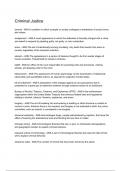Exam (elaborations)
Criminal Justice Questions with 100% Actual correct answers | verified | latest update | Graded A+ | Already Passed | Complete Solution
- Module
- Criminal Justice
- Institution
- Criminal Justice
Criminal Justice Questions with 100% Actual correct answers | verified | latest update | Graded A+ | Already Passed | Complete Solution
[Show more]



